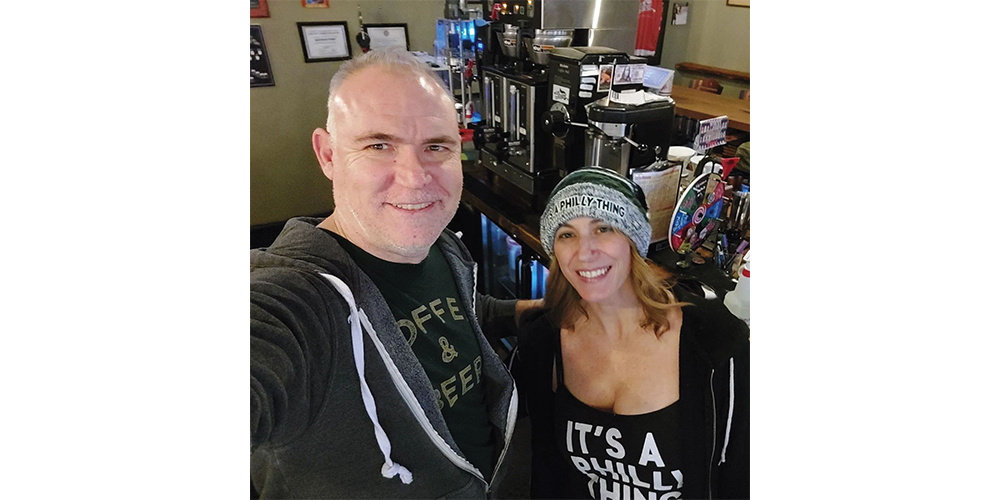Death of the Fox Founder and President Chuck Garrity gets ready for the Philadelphia Eagles’ NFC Championship Game alongside bartender/supervisor Tiffany Patch at their brewery in Clarksboro.(Photo Credit – Death of the Fox)
EAST GREENWICH – When New Jersey’s Division of Alcoholic Beverage Control enacted new rules targeting the state’s brewing industry last year, one local brewery became the face of the fight against them. Now, after dealing with the restrictions for several months, and despite Governor Phil Murphy’s talk of reforming alcohol licensing overall, there’s no indication that Death of the Fox Brewing Company plans on backing down anytime soon.
“I will continue to speak out,” said Death of the Fox Founder and President Chuck Garrity. “If the state wants to come after us again, then so be it.”
The regulations in question are a set of 18 special conditions issued by the ABC, originally in 2019, designed to limit the activities of craft beer brewers.
The breweries were spared from their implementation during the pandemic, but in July of last year the restrictions went into effect, with new rules about everything from serving food to the size of the TVs allowed in brewery tap rooms.
The state’s contention is that many breweries had overstepped the original intent of the 2012 law that allowed them to serve their beer on site at the breweries. Sentiment was growing in the liquor and restaurant industries that felt breweries were behaving too much like bars but without having to pay the high price of a liquor license.
“We believe the activities permitted under this Special Ruling strike a fair and appropriate balance between the interests of full retail license holders, such as restaurants and bars, and the craft brewing industry,” said ABC Director James B. Graziano in a news release about the rule changes back in 2019.
Naturally, many brewers see the situation differently. Garrity, in particular, has become something of a spokesperson for the industry, having been quoted in countless articles and interviews on the subject.
Of all the new restrictions in the ruling, Garrity said those limiting the number and types of events a brewery can host are the most troublesome.
“Limiting to 25 events a year has made it challenging,” said Garrity, whose Death of the Fox has called Clarksboro home since 2017.
He said the rules narrowing the number of events has caused them to make drastic cuts, while other times two or more of the rules might contradict one another, making them impossible to follow.
For instance, any playoff game shown on television counts as one of their 25 events, but breweries also must schedule events with the ABC 10 days in advance. Playoff schedules change week to week as a team advances from round to round, or even day to day in the case of a series.
This was the situation when the Philadelphia Eagles made their run to the Super Bowl, and the ABC had to make a special exception to their own rules.
“That shows you the state did not think this out,” Garrity said. “The ABC just basically let lobbyists write regulations without any type of forethought on how it would actually impact businesses.”
Along with being a vocal critic of the state’s rules, Garrity also filed a lawsuit in September to try and fight them.
“The focus there is just to get these conditions off of our license so we can conduct our business,” he said. “These things aren’t right, and the state didn’t go about it the right way. If you’re going to affect peoples’ lives like that, there needs to be things like a public comment period and a review first.”
Garrity said he’s hopeful about the outcome of the suit and said there could be a decision in the case this Spring.
But Garrity said the lawsuit and trying to undo the set of restrictions is only part of his fight. Larger reform, he said, is needed for the craft brewing industry to flourish in New Jersey to the extent it has elsewhere in the country.
Perhaps surprisingly, Governor Murphy echoed that sentiment during the annual State of the State address in January.
“There’s no other way to put it – our liquor licensing regime is antiquated and confusing,” Murphy said in the speech. “We rely on a foundation of rules written in the days immediately after Prohibition to govern a 21st century economy. That makes no sense.”
Murphy, who up to that point had been silent publicly about the brewery issue, addressed the legislature during the speech, saying he hoped broader reform could be achieved by making permanent changes to the laws.
“I ask for your partnership in rewriting our liquor license laws to make them not just modern, but fair,” Murphy said. “I further ask you to join me in removing outdated licensing and operating restrictions on our craft breweries, distilleries, and wineries, which are seeing nothing short of a true renaissance.”
Murphy also appeared on the News 12 New Jersey TV show “Ask the Governor,” where he was asked why he wouldn’t just do away with the rules if he disagreed with them, since the ABC falls under the administrative branch of state government.
“I would like to do it by executive order,” Murphy said. “I can’t.”
Perhaps unsurprisingly, Garrity takes issue with just about everything Murphy had to say, despite it sounding like they’re on the same page on the surface.
For one thing, Garrity contends Murphy could absolutely end the majority of the restrictions immediately by way of executive order. The brewery owner also finds it particularly galling that the governor lumps breweries and wineries together when the rules in question only specifically target the state’s beer producers.
Garrity also can’t help but feel that Murphy’s words do nothing but punt on the issue by paying lip service to alcohol licensing reform, which would take a long time to happen in the legislature, if ever.
He also wonders if the moves against the breweries, were made in part to force the legislature to address the overall picture.
“It’s almost like he’s trying to purposely obfuscate the issue,” Garrity said. “It seems very much like we are the pawn in the game. Essentially what they’re doing is putting all these ridiculous rules, and they know they’re ridiculous, to try to get the legislature to act.”
Whether or not the state’s brewers are truly pieces in a bigger political chess match, or simply victims of more powerful lobbying interests, the changes they’ve had to endure have been damaging, Garrity said.
“It’s now been in place for eight months,” he said. “We have seen so many difficulties.”
Tiffany Patch, a longtime bartender and supervisor at Death of the Fox, said she’s struggled personally as a result of the changes.
“It’s really upsetting,” Patch said. “It’s frustrating. From the perspective of somebody who has been there for four years – pre-pandemic, pandemic, and post-pandemic – things were starting to pick back up again, and the world seemed to be returning to some sort of normalcy, and now this.”
Patch said there’s a big difference between the business she does behind the bar with an event and without an event.
“On a Saturday night when we have live entertainment, I’m making double the tips,” she said. “That’s a huge impact.”
Patch said she’s also seen the ripple effect that the new rules have had.
“You talk to the local musicians who have performed there and it’s upsetting to them,” she said. “They’re losing out as well. There are a lot of business owners that are affected by this government choice, not just the brewery.”
Prior to the rule changes, Death of the Fox, like other breweries, held a wider variety of events than they do now. Patch said this has limited the scope of the brewery’s audience to some extent.
“We do coffee and beer, so it brings families out,” she said. “These are families that can no longer enjoy entertainment. You’re not going to take your family to a bar necessarily. That’s a different environment.”
One such event that stopped soon after the rules were enacted was a “Quizzo” trivia night, hosted by area resident Joe Morris.
“We had people there to do it, and we were building steam, and then we couldn’t advertise anymore,” said Morris, a musician and educator, who said his event had only been running for a couple of months before it was forced to end. The impact of the cancellation was a painful one.
“I live my life in gigs,” Morris said. “Each gig is a block in the total amount of money that we need to operate as a family. You keep taking those blocks away, then the whole being able to live your life being creative becomes that much more difficult.”
Morris has run a similar quiz night at a bar in Philadelphia for many years, giving him a perspective on how things are going in two states and in both industries.
“You should probably try to spur economic growth rather than stay beholden to some antiquated system,” he said. “It doesn’t seem like the restaurant/bar industry wants to engage in any kind of reasonable compromise. Anybody like the breweries who wants to try to come in and do something cool and build community, and they try to shut them down? What are you doing?”
For now, what Garrity and Death of the Fox will be doing is hanging on, awaiting the outcome of their lawsuit, and holding out some hope that there could be bigger changes on the horizon.
“We just want to be able to conduct our business,” Garrity said. “We want to make great beer, be able to provide our customers with a great experience and give them some levity from their work weeks.”
By Joe D’Aquila









4 Responses
I’m sick of reading about how these politicians are trying to ruin people’s businesses.
There’s no better place than the DOF & every1 loves it there.
All of Us will be there to stand behind them! & I don’t drink beer! 🤗
Janet, you might also want to complain to the bar and restaurant owner industry groups who have paid off the politicians.
Bars need to step up their game: they already have the advantages over breweries of selling other alcohol like wine and mixed drinks and selling food. Maybe they need to sell decent beer to attract the people that go to breweries. It’s not the same market for the most part but the bars/restaurants are trying to cripple the brew industry in NJ by paying off the politicians to hurt breweries.
Support your local breweries. (And small food places without liquor licenses for takeout to bring to them!)
According to information released on the chemical, it was about 8,100 gallons of a ‘water soluble acrylic polymer solution’. Samuel Manka, a marine science technician with the U.S. Coast Guard said, “It’s like the material you find in paint,” said Thomas. “It’s your typical acrylic paint you have in your house, that’s what really this material is, in a water base.” The company responsible for the chemical spill is Trinseo.